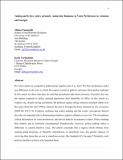Files in this item
Taking partly free voters seriously : autocratic response to voter preferences in Armenia and Georgia
Item metadata
| dc.contributor.author | Fumagalli, Matteo | |
| dc.contributor.author | Turmanidze, Koba | |
| dc.date.accessioned | 2019-02-17T00:34:16Z | |
| dc.date.available | 2019-02-17T00:34:16Z | |
| dc.date.issued | 2017 | |
| dc.identifier | 251040069 | |
| dc.identifier | c0f5a661-caed-4b71-8f15-66c36f570fb4 | |
| dc.identifier | 85043986497 | |
| dc.identifier.citation | Fumagalli , M & Turmanidze , K 2017 , ' Taking partly free voters seriously : autocratic response to voter preferences in Armenia and Georgia ' , Caucasus Survey , vol. 5 , no. 3 , pp. 199-215 . https://doi.org/10.1080/23761199.2017.1342369 | en |
| dc.identifier.issn | 2376-1199 | |
| dc.identifier.other | RIS: urn:7B08E9F1C004A7433FF79CF99F58E377 | |
| dc.identifier.other | ORCID: /0000-0002-1451-2088/work/36697391 | |
| dc.identifier.uri | https://hdl.handle.net/10023/17081 | |
| dc.description | This work was supported by a grant from the Academic Swiss Caucasus Net. | en |
| dc.description.abstract | Do voters matter in competitive authoritarian regimes and, if so, how? Do their preferences make any difference in the way in which the regime conceives policies and goes about policy-making? In this article we show that they do, and that incumbents take them seriously. Crucially, the way the regime responds to policy demand determines their durability in office. In this article we explain why, despite strong similarities, the political regime ruling Armenia remained stable over the years (from the mid-1990s), whereas the one in Georgia has been unseated on two occasions (2003-2004 and 2012-2013). Evidence confirms that policy-making and the voters' perceptions thereof also play an important role in determining whether a regime collapses or survives. The incumbents collect information on voter preferences, and devise policies in response to them. Policy-making thus matters and is extremely consequential. Paradoxically, however, policy-making makes a difference in counter-intuitive ways. The article concludes that a regime which refrains from making grand promises, or blatantly contradictory or unrealistic ones, has greater chances of surviving than those that set out to transform society, like Saakashvili's Georgia. Ultimately, such policies backfire on those who launched them. | |
| dc.format.extent | 17 | |
| dc.format.extent | 965438 | |
| dc.language.iso | eng | |
| dc.relation.ispartof | Caucasus Survey | en |
| dc.rights | © 2017 International Association for the Study of the Caucasus. This work has been made available online in accordance with the publisher’s policies. This is the author created accepted version manuscript following peer review and as such may differ slightly from the final published version. The final published version of this work is available at https://doi.org/10.1080/23761199.2017.1342369 | en |
| dc.subject | Competitive authoritarianism | en |
| dc.subject | Regime stability | en |
| dc.subject | South Caucasus | en |
| dc.subject | Armenia | en |
| dc.subject | Georgia | en |
| dc.subject | JZ International relations | en |
| dc.subject | J Political Science | en |
| dc.subject | 3rd-DAS | en |
| dc.subject.lcc | JZ | en |
| dc.subject.lcc | J | en |
| dc.title | Taking partly free voters seriously : autocratic response to voter preferences in Armenia and Georgia | en |
| dc.type | Journal article | en |
| dc.contributor.institution | University of St Andrews.School of International Relations | en |
| dc.identifier.doi | 10.1080/23761199.2017.1342369 | |
| dc.description.status | Peer reviewed | en |
| dc.date.embargoedUntil | 2019-02-17 |
This item appears in the following Collection(s)
Items in the St Andrews Research Repository are protected by copyright, with all rights reserved, unless otherwise indicated.

